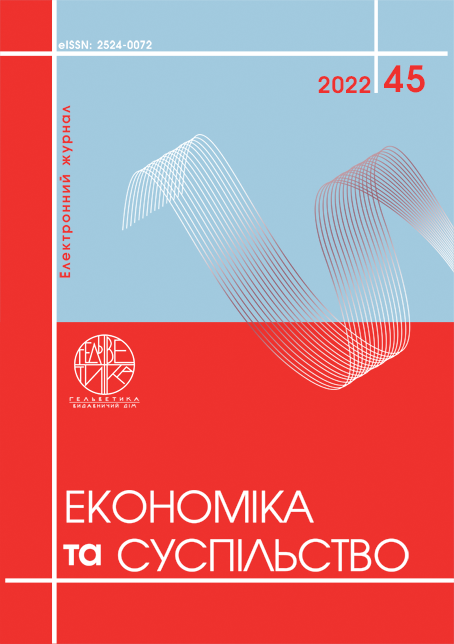WELL-BEING IN CORPORATE MANAGEMENT: KEY MODELS AND IMPACT ON ECONOMIC BEHAVIOR
Abstract
The article is discus the topical issues related to the problems of ensuring Well-being in corporate management, in particular, its main models and determining the impact on the economic behavior of decision-making subjects. The proper understanding of Well-being in corporate management as a system of corporate strategy measures aimed at nurturing the well-being of individual individuals (physical health, psychological comfort, financial well-being, active social interaction), and through them – members of the team, collective and all employees of the company is provided. The role of Well-being in the corporate management system is revealed through the study of models of well-being, in particular, the simple model of well-being, the classic model of Well-being PERMA by M. Saligman, the model of interaction of stakeholders of Well-being corporate events. An approach to ensuring corporate Well-being based on a cognitive-behavioral concept is proposed and a cognitive-behavioral model of Well-being based on the concept of life satisfaction is built. The concept of life satisfaction is a set of approaches that explain external objective results of human activity with internal subjective feelings of happiness and life satisfaction. The structure of the cognitive-behavioral model of Well-being is defined, which, in addition to life satisfaction factors, includes the following components: economic behavior, attitude to money and monetary behavior, risk and rationality in decision-making. Diagnostics of factors of life satisfaction (life involvement, disappointment in life, fatigue from life, concern for the future) makes it possible to determine the degree of development of Well-being in corporate management. The basis for the cognitive-behavioral model of Well-being is the method of diagnosing life satisfaction (N. Melnikova), which contains four groups of parameters: life inclusion, disappointment in life, fatigue from life, concern for the future. The conducted studies proved that life satisfaction factors significantly affect other components of the model: economic and monetary behavior, personal decision-making factors (risk and rationality).
References
Ruggeri, K., Garcia-Garzon, E., Maguire, Á. et al. (2020). Well-being is more than happiness and life satisfaction: a multidimensional analysis of 21 countries. Health and Quality of Life Outcomes. № 18(1). Р. 192–198.
Ivonne Wollny, Joanna Apps, Clam Henricson (2010). Can Government Measure Family Wellbeing. Research and Policy for the real world. 88 p. Available at: https://www.researchgate.net/publication/265043980_Can_government_measure_family_wellbeing (дата звернення: 15.11.2022)
OECD Guidelines for Measuring Subjective Well-Being. Available at: https://www.oecd.org/wise/oecd-guidelines-on-measuring-subjective-well-being-9789264191655-en.htm (дата звернення: 20.11.2022)
Хартер Дж., Рат Т. Все отлично! Пять элементов благополучия. Москва : Альпина Паблишер, 2015. 228 c.
National surveys reveal disagreements between workers and employers over the need for mental health. Mckinsey & Company. Available at: https://www.mckinsey.com/industries/healthcare-systems-and-services/our-insights/addressing-the-unprecedented-behavioral-health-challenges-facing-generation-z (дата звернення: 20.11.2022)
М. Seligman. Seligman's FARM+Model Explained: A Theory of Wellbeing. Available at: https://positivepsychology.com/perma-model/ (дата звернення: 20.11.2022)
Вартанова О.В., Ровнягін О.В. Ревіталізація концепції економічної поведінки та ірраціональності її суб'єктів у прийнятті рішень. Таврійський науковий вісник. Серія: Економіка. 2022. Вип. 13. С. 9–15.
Вартанова О.В. Діагностика раціональності в економічній поведінці майбутніх менеджерів. Економіка і суспільство. 2021. № 34. URL: https://economyandsociety.in.ua/index.php/journal/article/view/965/923
Furnham, A. (1984). Many sides of the coin: the psychology of money usage. Personality and Individual Differences. № 5. Р. 501–509.
Savchenko О. Consciousness and reflection in the basis of psychological theorizing. Psychology & society. 2018. № 3–4. Р. 67–89.
Savchenko O.V., Htej S. (2020) Metodika dіagnostiki aspektіv spozhivac'koї povedіnki studentіv [Methods of diagnosing aspects of consumer behavior of students]. Organіzacіjna psihologіja. Ekonomіchna psihologіja, vol. 4(21), pp. 96–109. (in Ukrainian)
Ruggeri K., Garcia-Garzon E., Maguire Á. et al. (2020) Well-being is more than happiness and life satisfaction: a multidimensional analysis of 21 countries. Health and Quality of Life Outcomes. № 18(1). Р. 192–198.
Ivonne Wollny, Joanna Apps, Clam Henricson (2010). Can Government Measure Family Wellbeing. Research and Policy for the real world. 88 p. Available at: https://www.researchgate.net/publication/265043980_Can_government_measure_family_wellbeing
OECD Guidelines for Measuring Subjective Well-Being. Available at: https://www.oecd.org/wise/oecd-guidelines-on-measuring-subjective-well-being-9789264191655-en.htm
Harter Dzh., Rat T. (2015) Vse otlichno! Pjat' jelementov blagopoluchija [Everything is great! Five elements of well-being]. Moskva: Al'pina Pablisher, 228 p. (in Russian)
National surveys reveal disagreements between workers and employers over the need for mental health. Mckinsey & Company. Available at: https://www.mckinsey.com/industries/healthcare-systems-and-services/our-insights/addressing-the-unprecedented-behavioral-health-challenges-facing-generation-z
М. Seligman. Seligman's FARM+Model Explained: A Theory of Wellbeing. Available at: https://positivepsychology.com/perma-model/
Vartanova O.V., Rovniahin O.V. (2022) Revitalizatsiia kontseptsii ekonomichnoi po-vedinky ta irratsionalnosti yii subiektiv u pryiniatti rishen [Revitalization of the concept of economic behavior and irrationality of its subjects in decision-making]. Tavriiskyi naukovyi visnyk. Seriia: Ekonomika, vol. 13, pp. 9–15. (in Ukrainian)
Vartanova O.V. (2021) Diahnostyka ratsionalnosti v ekonomichnii povedintsi maibutnikh menedzheriv [Diagnostics of rationality in the economic behavior of future managers]. Ekonomika i suspilstvo, vol. 34. (in Ukrainian)
Furnham A. (1984) Many sides of the coin: the psychology of money usage. Personality and Individual Differences, vol. 5, pp. 501–509.
Savchenko О. (2018) Consciousness and reflection in the basis of psychological theorizing. Psychology & society, vol. 3–4, pp. 67–89.


